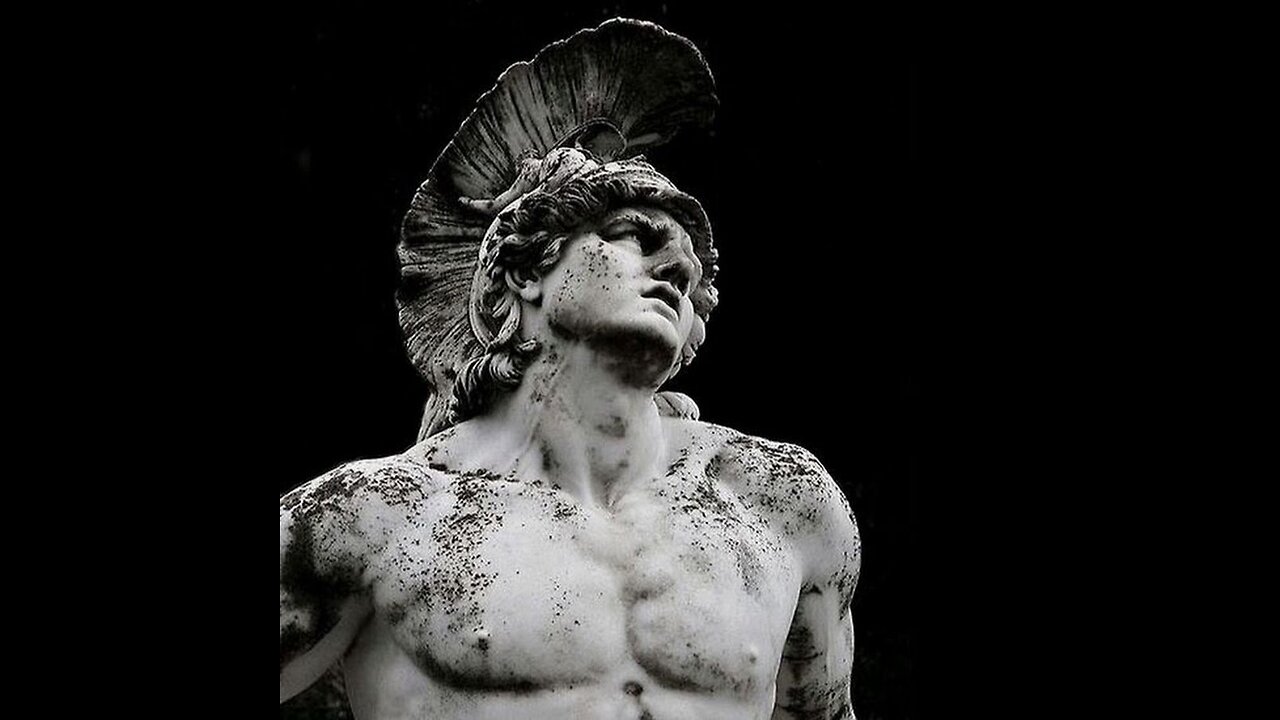Premium Only Content

Homer's Iliad Book 9 (translated by Robert Fagles)
Agamemnon calls a meeting of the Greek leaders and proposes abandoning the struggle. Diomedes asserts his resolve to remain, and Nestor counsels patience. After feasting, the chiefs assemble again, and Nestor advises Agamemnon to make overtures to Achilleus. Agamemnon agrees, admitting that he was not in his right mind when he dishonoured Achilleus. He gives a long list of gifts and honors which Achilleus will receive if he returns to the battle; this list includes Briseis, whom Agamemnon swears he has not touched. Agamemnon closes with four less tactful lines, comparing the pitilessness of Achilleus to that of Hades, the god of death, and opining that Achilleus ought to yield to higher authority. The assembly selects three ambassadors (Odysseus, Phoinix, and Aias) and sends them to Achilleus. They find him playing the lyre and singing epic verses by the shore. They feast, and then Odysseus makes the first of the speeches imploring Achilleus to return. First he apprises Achilleus of the strategic situation, using the rhetorical device of hyperbole to magnify the danger in which the Achaians find themselves. Second, he touches Achilleus' heart by speaking in the voice of his father Peleus, sending him off to Troy and warning him to avoid quarrels. Third, he repeats Agamemnon's list of gifts and honors, artfully substituting the glorious prospect of killing Hektor for the original last four lines. Achilleus responds with an impassioned speech, rejecting Odysseus' arguments roughly in reverse order. What good will honor do if he is dead? Why has Agamemnon waited so long to share the plunder equitably? If Menelaos and the rest have gone to war for the sake of Helen, why should not Achilleus do the same against Agamemnon for the sake of Briseis? Achilleus again threatens to return home to Phthia, claiming that he prefers what awaits him there to all the gifts promised by Agamemnon. As if convincing himself of the rightness of this course, he recalls Thetis' prophecy about his two futures: a quick but glorious death at Troy, or a return home and a long life of domestic tranquility. Next Phoinix, an old friend of Achilleus' family, takes his turn at persuasion. He recalls his own personal history, how he came to live in the palace of Peleus, and saw Achilleus grow up. He warns Achilleus about the dangers of Ruin (Atê). To illustrate the principle that all stubbornness is eventually overcome, he tells the story of Meleagros, slayer of the Kalydonian boar. During the war beteen the Aitolians and the Kouretes, Meleagros stayed away until the city of Kalydon was nearly taken, then entered the battle and saved the day. In his response, Achilleus admits that Phoinix has moved him, but still he refuses to comply. Last of all, Aias takes his turn. In his blunt way, he suggests that Achilleus has moved well outside the realm of societal norms (nomos); in society, even a murderer can be forgiven. Unmoved, Achilleus swears not to return to the battle until the Trojans have set the Achaian ships ablaze. The embassy returns and reports Achilleus' decision; Diomedes says they must fight on without him, and the others agree.
-
 LIVE
LIVE
Redacted News
1 hour agoEMERGENCY! 10 MILLION UNDER FIRE WARNING & 100 MPH WINDS, NEWSOM UNVEILS CALIFORNIA 2.0 PLAN
13,637 watching -
 LIVE
LIVE
Candace Show Podcast
1 hour agoI Respond To Mr. And Mr. Macron | Candace Ep 131
8,658 watching -
 LIVE
LIVE
Revenge of the Cis
2 hours agoEpisode 1429: Catch And Release
1,981 watching -
 LIVE
LIVE
Film Threat
7 hours agoVERSUS: HOLLYWOOD IS STILL ON FIRE | Film Threat Versus
147 watching -
 12:33
12:33
Silver Dragons
1 hour agoSilver Price Crushed Today - NEW TREND STARTING?
2.27K -
 1:02:03
1:02:03
In The Litter Box w/ Jewels & Catturd
20 hours agoRecall Newscum & Bass! | In the Litter Box w/ Jewels & Catturd – Ep. 718 – 1/13/2025
38.7K15 -
 3:19:58
3:19:58
Tate Speech by Andrew Tate
8 hours agoEMERGENCY MEETING EPISODE 101 - STRENGTH AND HONOR
129K52 -
 1:48:09
1:48:09
The Quartering
4 hours agoLA Fires Are About To Get Way Worse, Trump Vs Vance On J6 Pardons, Brett Cooper Bombshell & More
83.1K31 -
 LIVE
LIVE
Dr Disrespect
5 hours ago🔴LIVE - DR DISRESPECT - MARVEL RIVALS - TOP 500 IN THE WORLD
3,355 watching -
 1:05:49
1:05:49
MTNTOUGH Fitness Lab
7 hours agoDamon West: How Faith and Mental Toughness Helped Me Escape Prison | MTNPOD #99
6.49K